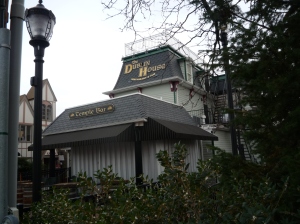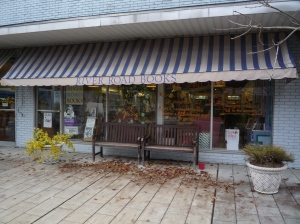Walking Bookstores and Bars: Red Bank, Late November
by Tobias Carroll
My hometown was not designed to be walked through. The characteristics of the towns in which my parents came of age seem archetypal now, but alien to a younger version of me: sidewalks, stores within walking distance, a general sense of accessibility running throughout the community. The neighborhood in which I grew up has no sidewalks; just wide suburban roads with a span hopefully allowing cars to pass one another with room for walkers or runners on either side. I didn’t become used to walking longer distances until college, and now it’s something of a compulsion: on a visit to Seattle earlier this year, I made a miles-long trip from my hotel to Capitol Hill and back twice in the span of one day. It seemed like the easiest thing to do.
Next to my hometown is a town called Red Bank, a name that’s likely familiar if you’ve seen the film Chasing Amy or — and this might be more of a stretch — listened to the band Monster Magnet, whose frontman once worked the front counter in a comic book store long since shuttered. Red Bank has a downtown, has a music shop and a couple of bars and — this was news to me — an Urban Outfitters, down the street from a tuxedo shop I’d last visited at the age of eighteen. I’d had an idea circulating for the better part of a year: I wanted to walk the streets of Red Bank for a while, to look back at places that I used to frequent, to see what had become of storefronts and shop windows I once knew by heart.
I also wanted to see what new places had arisen since I’d last gone wandering there. Via Word Riot’s Jackie Corley, I’d heard of a reading series now held in Red Bank, and the process of looking into that gave me some new spaces to investigate. This walk would have a literary component because many of my memories of trips to Red Bank end with trips home, reading material in hand. And so, on a Friday in late November, I borrowed my dad’s car for a few hours, drove down Shrewsbury Avenue, and parked next to the train station.
My first stop was the Frank Talk Art Bistro and Bookstore, which I’d heard about in the context of the River Read Reading Series. They were closed when I approached the store, but in the windows I saw a selection of literary magazines along with titles from James Baldwin and Jonathan Franzen. I walked further north, past the building that once housed the AAUW Used Book Sale, where I spent many a Saturday losing myself in dusty shelves of 70s science fiction paperbacks and paperback collections of comics from MAD magazine. Said book sale — now held in Middletown, to the north — was one of a few places in which I started working my way towards the areas of interest that I still call home. Alternately: never underestimate the role of a used bookstore in the nascent years of a young nerd.
Even so, the Used Book Sale was always the most esoteric of the three used book shops that I visited in Red Bank — the shelves high and imposing and industrial, the books disparate in age and condition, the range of titles on hand spanning genres and areas of interest. Memory tells me that I was ten, eleven, twelve years ago when I was there. Most of the books on display seemed alien to me then, out of the realm of my general interest — not science fiction or fantasy or comics, and so irrelevant.
Across the street from the train station, I walked briefly into Novel Teas, which (I later learned) now serves as the home for the River Read series. If I’d brought along the novel I was reading at the time (Adam Levin’s The Instructions), I would have gladly sat there for a while, drinking coffee or tea and making my way through the book. As it was, I bought a couple of small pecan rolls for my parents, walked back to the car, and made my way to a parking lot near Red Bank’s small movie theater.
I parked in sight of a bar called The Dublin House, one of the few constants in my time spent in Red Bank. Their upstairs level was once a coffee house, and in high school I’d gather there with friends — sometimes to hear music played, sometimes just for coffee. In more recent years, it became a regular spot to get a low-key pint and, occasionally, stare at the television sets behind the bar, unsure of what the sport we were watching actually was. (Gaelic football, it turned out.) Across the street from the Dublin House sat a New Age shop. I remembered a bookstore having been in its vicinity when I was in middle and high school, but I couldn’t remember the specific address. Had the bookstore shifted its focus, changed its name and appearance? Or was I looking in the wrong place, at the wrong storefront? I crossed the street and walked past a few windows, looking up at archways and trying to find something that triggered a memory, that brought back recall of a younger me, standing there and waiting to go inside. Nothing came to mind; blame it on the vagueness of memory, or — more charitably — some structural remodeling.
From there, I walked to Broad Street, perpendicular to White. Twenty years earlier, there had been a used bookstore on that corner, Twice Sold Tales, with a copious science fiction section and bookmarks that still turn up on shelves at my parents’ home. Twice Sold Tales was a shop I would generally visit with my mother in tow, or possibly vice versa. It existed before I was old enough to drive, and my trips there were never made alone. I would walk through the door and to the left, up a short flight of stairs and — nascent nerd, remember — stand in front of their science fiction section to see what was new on the shelves. There would be brief forays into the horror section beside it, and to the general fiction section on the opposite side of the shelves, but by and large, my take on the store came from one section and one section alone.
A block and a half away was the former site of The Book Pit, a used bookstore that opened, I believe, around the time I left for college in 1995. By contrast, this was a store I generally visited alone, under my own power, or sometimes with likeminded friends. There were stacks of books on the floor, resting against already-crowded shelves, and by this point, most of the store’s sections held work of interest. Their selection was broad, and I can remember seeking out everything from Neil Gaiman-penned graphic novels (specifically, a trifecta of Sandman collections) to George Pelecanos’s The Big Blowdown.
There was a stop I wanted to make outside of Red Bank before the afternoon was over — a bookstore to the east — and I knew that my time for wandering was winding down. I wandered into Jack’s on Broad Street, a cavernous space covering both the musical-instrument and recorded-music sides of things. I walked up and down the aisles, looking at CD section dividers and an impressive selection of vinyl. (Their buyer is, I daresay, quite fond of the wares offered by Sacred Bones Records; looking at Moon Duo records in Monmouth County made me just a bit homesick.)
Steve Earle’s “Copperhead Road” was playing as I noted the store’s Built to Spill/Caustic Resin/Doug Martsch section. It seemed tailor-made to indie rock fans of a certain age — an age that is not dissimilar to my own. A thought crossed my mind: “If I lived here, this would totally be where I’d shop for music.” It’s a thought that I’ve also had in record stores in Minneapolis, Portland, Seattle, and Chicago. As I stood there in a record store five minutes from the house in which I grew up, I realized that I no longer felt much claim to the region. I was walking through Red Bank as though I might walk through any city that I visit every couple of years, finding spaces that looked intriguing, mapping out what a life living there would be like; finding places where I might be a regular. Standing in a record store one town away from my hometown, I realized that I felt like a tourist. Maybe it was inevitable; maybe, after so many years gone and no plans to return, the time for it was right.
Coda
I left Red Bank and drove two miles east to River Road Books in Fair Haven. I parked down the street and walked inside, paging through fiction, looking in their YA section for Paolo Bacigalupi’s Ship Breaker, eyeing Amis and Waugh in their classics section, and settling on Zadie Smith’s essay collection Changing My Mind. I walked out onto the street with the book under my arm and walked back to the car, past cafe tables on the corner and piles of leaves at my feet. The familiarity may have passed, but it was a fine autumn day; there was a book in my hand and a chill in the air. And, for that short walk, where I happened to be was irrelevant.




